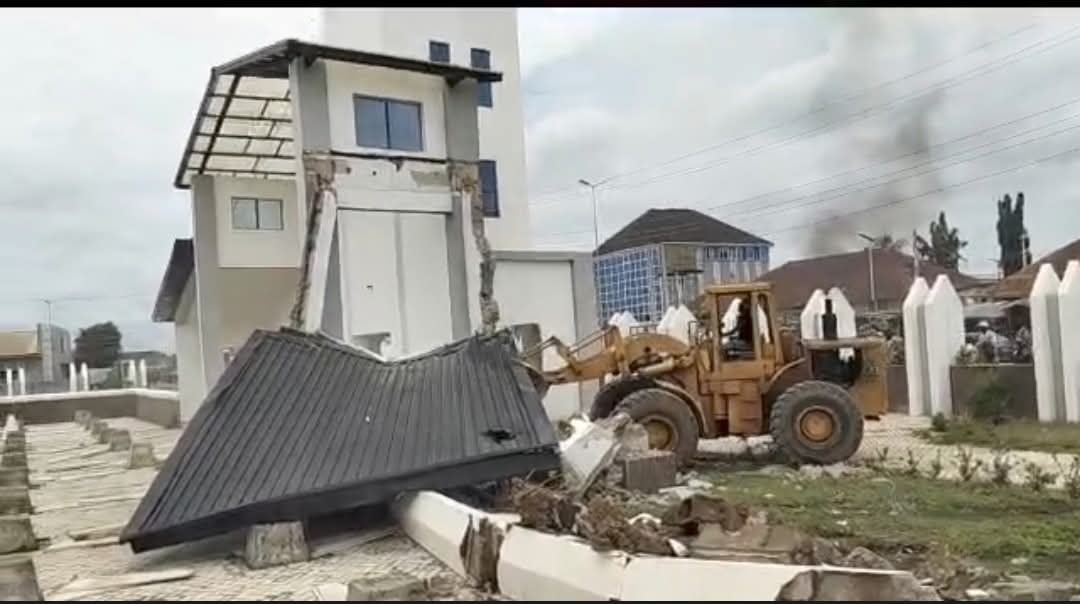By David Akinadewo-Adekahunsi
When demolition machines tore down the Memorial Park in Owo, Ondo State, at the weekend, it was not just bricks and marble that fell. For many in the ancient town, it felt like memory itself had been shattered alongside public trust, civic sentiment, and the integrity of remembrance.
Erected in honour of victims of the St. Francis Catholic Church massacre of June 5, 2022, the park had stood as a solemn monument to one of Nigeria’s darkest moments. Its sudden removal, however, has re-opened old wounds and ignited fresh controversy.
The Memorial Park was constructed by the late Governor Oluwarotimi Odunayo Akeredolu, SAN, who hailed from Owo and felt deeply the pain of the tragic attack that claimed over 40 lives in his hometown. He had envisioned the park not only as a symbolic space for mourning and reflection, but as a permanent civic monument, one that would forever honour the innocent lives lost in the sanctity of worship.
Commissioned in June 2023, on the first anniversary of the massacre, the Memorial Park featured engraved names of victims, landscaped gardens, a solemn cenotaph, and artistic sculptures that communicated pain, resilience, and the will to endure.
Strategically located in front of the palace of the Olowo of Owo, the park quickly became a landmark and a rallying point for community remembrance. But for all its grandeur and emotional value, the location of the park sparked quiet discontent within the traditional council and segments of the community.
Over the weekend, its demolition, widely believed to have been ordered by the administration of Governor Lucky Orimisan Aiyedatiwa, set off a firestorm of reactions. Many residents were stunned that such a symbol of collective memory could be erased so casually.
Given that Governor Aiyedatiwa had served as Akeredolu’s Deputy during the period the park was constructed, the act was seen by some as a shocking departure from continuity and loyalty.
However, in a significant twist, the Olowo-in-Council, the apex traditional authority in Owo, released a statement that not only confirmed longstanding opposition to the park’s location, but also distanced the current administration from the decision to site it in front of the palace.
Speaking on behalf of the Olowo-in-Council, High Chief Sunday Fatoba, the Sashere of Owo Kingdom, stated that the late Governor Akeredolu had proceeded with the project despite “concrete positions canvassed by the community” that it was inappropriate for such a memorial to be located directly in front of the palace.
According to High Chief Fatoba, “The Olowo-in-Council had expressed strong cultural and traditional objections to the siting of the park. The revered palace space carries deep historical and spiritual significance to the people of Owo. A memorial of such tragic tone, while deeply appreciated in essence, was not deemed suitable for that location. Unfortunately, the late Governor, in his wisdom and resolve, insisted on going ahead.”
By issuing this clarification, the traditional council has effectively exonerated the current administration of Governor Aiyedatiwa from any moral or cultural wrongdoing. What might have been interpreted as a politically motivated demolition is now viewed, at least in some quarters, as a belated correction of what the traditional authorities considered a misplacement of civic priorities.
Nonetheless, emotions remain raw. For relatives of the victims, the park was more than just its geographical coordinates, it was a physical manifestation of their grief, and a rare official recognition of their loss. Its destruction, even if done with cultural justification, reopens the psychological wounds they have struggled to heal.
“They have taken away the only thing that reminded us that our children did not die in vain,” said Mrs. Olaitan Ajibola, who lost her husband and niece in the June 2022 attack.
“That park was built for all of us. They should have found a way to relocate it, not destroy it,” She added.
For many observers, the episode has revealed an underlying tension between public governance and traditional institutions, one that often plays out behind closed doors in many Nigerian communities. While elected officials may be driven by political vision and public sentiment, traditional rulers and councils remain custodians of local customs, symbolism, and spatial sacredness.
Governor Aiyedatiwa’s silence on the matter has also drawn mixed reactions. While some commend his restraint and deference to the palace, others believe a public engagement or statement would have helped to clarify the government’s position and calm the emotionally charged atmosphere.
Analysts believe the controversy also points to the need for better community consultations in the siting of public monuments. Though constructed with good intentions, the Memorial Park’s location was contentious from inception. In a traditional city like Owo, where symbolism and spatial etiquette matter deeply, such decisions require cultural clearance as much as executive authority.
Yet, the loss of the Park in its original form is undeniable. Whether or not the current administration intends to rebuild it elsewhere remains to be seen. So far, there has been no official announcement about relocation, reconstruction, or plans to honour the victims in a new manner. For the bereaved, such silence is worrying.
The demolition of the Memorial Park has no doubt drawn strong objection from several quarters, but perhaps none as emotionally charged and personally significant as that of the late Governor Oluwarotimi Akeredolu’s wife, Betty Anyanwu-Akeredolu.
In a statement issued shortly after news of the demolition broke, Mrs Akeredolu expressed deep pain and disappointment over what she described as a deliberate act of dishonour against her late husband’s legacy.
She noted that the park was not just a public monument, but a deeply personal project to her husband, who, as a native of Owo, had taken it upon himself to immortalise the memory of the innocent souls lost in the 2022 church attack.
Mrs Akeredolu criticised the current administration’s silence and lack of consultation before the demolition, calling it “an insult to the memory of the dead and an affront to the conscience of a grieving community.”
She argued that the park was not only symbolic but therapeutic for families of the victims, many of whom saw it as a space of solace, healing, and civic recognition.
According to her, taking it down without offering an alternative or even a public explanation was both tactless and disrespectful to the trauma endured by Owo residents, and more broadly, the people of Ondo State.
She also questioned the motives behind the decision, warning against any attempts to politicise or erase the legacies of those who served with vision and compassion.
For Mrs Akeredolu, the Memorial Park represented her husband’s unwavering commitment to justice, empathy, and the dignity of human life.
She called on the government to reconsider its stance, urging leaders to rise above personal or political differences and focus instead on preserving the integrity of communal memory. “History does not forgive those who choose convenience over compassion,” she said.
In the absence of the park, only memory remains—and the ruins of what was. The flattened ground now sits fenced off, quiet and awkward, as if unsure of what it used to mean.
For residents passing by, the sight is sobering. It reminds them not just of tragedy, but of impermanence.
“This is not about politics,” said Mr. Tunji Adebayo, a youth leader in Owo. “It is about memory, and about how we choose to honour those we lost. The park was not perfect, but it was something. It gave us a place to grieve, to teach our children, to remember. Now it is gone.”
Whether the Aiyedatiwa administration will seize the opportunity to rebuild public confidence by engaging all stakeholders including the Olowo-in-Council, victim families, and civil society remains a critical question.
In a country where traumatic events are often swept under the rug, symbolic acts of remembrance carry weight beyond stone and sculpture.
The controversy over the demolished Memorial Park is a reminder that how we remember is just as important as what we remember. And as the people of Owo continue to grieve, they also watch—and wait—for a new symbol to rise from the rubble.
- Akinadewo-Adekahunsi, the Editor-in-Chief of Nigerian Monitor and a media consultant, writes from Akure.





